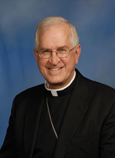Hope in the Lord — St. Paul on Twitter?
May 23, 2013

These weekdays of the Easter season treat daily Mass-goers to the exciting early days in the life of the Church – especially to the activities of St. Paul, whose zeal, energy, and missionary creativity was second to none. Recently, we heard about the scene at the Areopagus in Greece with Paul right in the middle of the crowd courageously speaking the name of Jesus.
I believe it was the bank robber Dillinger who, when asked why he robbed banks, replied: “Because that’s where the money is!” It is good to recall how Paul went out to where the people were, especially since the new evangelization is coming into full swing in the life of the Church. Certainly in his early days, Pope Francis is promoting the new evangelization as an exercise in this type of outreach.
Some have asked what St. Paul would think of the new forms of social media today. I can’t help but think he would be right there, learning and using them for the Lord Jesus. It is now 18 months since I waded into the waters of “Twitter.” Seminarian Shayne Duvall reminded me recently how I started. He was then Director of Evangelization in the Archdiocese, and I asked to meet with him, saying simply, “I just joined Twitter. Now what do I do?” If you are asking that question now, consider the benefits.
While I can’t compete with rock stars whose followers are in the millions, I am inching toward four thousand, and each time something I send gets “re-tweeted,” the audience grows exponentially. It has been a great adventure and not overly time-consuming. I began following some news sources and individuals and soon found myself re-tweeting some sayings that I came across from Scripture or a modern author like C. S. Lewis.
Then, I found tweeting provided the perfect audience to re-tell something appearing elsewhere. So, my columns for The Record or YouTube segments from the monthly television show Conversations were easy to tweet, thanks to the expertise of staff members Cecelia Price, Lori Massey, and others. Then it became easy and fun to share photos of some of the pastoral activities in which I was engaged within and beyond the Archdiocese. Taking photos of those about to be confirmed was a wonderful way to ease into a parish and also a way to invite new followers.
While I am not sure what St. Paul would have done with this new medium, I am sure he would have been there.
There are two cautions that I would like to discuss. First, there is no substitute for personal, face-to-face, pastoral contact. I imagine Twitter, Facebook, and the other modern vehicles of the Internet can tempt one to sit at a desk and never see a face or hear a voice again. This would be a great mistake. However, these communication vehicles can greatly augment those personal contacts.
A second caution involves the importance of cultivating discriminating tastes. Some have asked me if I have had problems with those who use Twitter for sordid purposes. I must admit that there have been a few unwelcome followers who did not exhibit good manners or use the best of language. I learned how to “block” these individuals and solved this problem. A lesser concern has to do with those who combine legitimate uses of Twitter with an overuse of this communication for personal, day-to-day conversations with friends that ends up inundating followers with too many tweets. I call these “bad-hair-day” tweets, and much more gently, I block these tweets so that these individuals can have their conversations, and I can prevent an avalanche of tweets.
These two cautions actually raise a deeply moral question that is too often ignored today. Just because we have the scientific or technical ability to do something, does it follow that we should do it? The “can do” must be followed by the “ought to do” question. Obviously, there are urgent moral questions from the scientific capacity for genetic engineering, such as human cloning, to the use of weapons that indiscriminately take innocent life. The Church has rightly seen these possibilities as immoral and, therefore, paths we ought not to take.
On a personal level, the various forms of social media present this dilemma and invite our discerning use as we always seek to remember our call to communicate the good news of Jesus Christ.
So what would St. Paul do? He surely would be the big spokesman for the new evangelization and, using it for morally good purposes, would be on-line to announce the good news of Jesus Christ where the people are.
Archbishop Kurtz’s Twitter handle is @ArchbishopKurtz.




